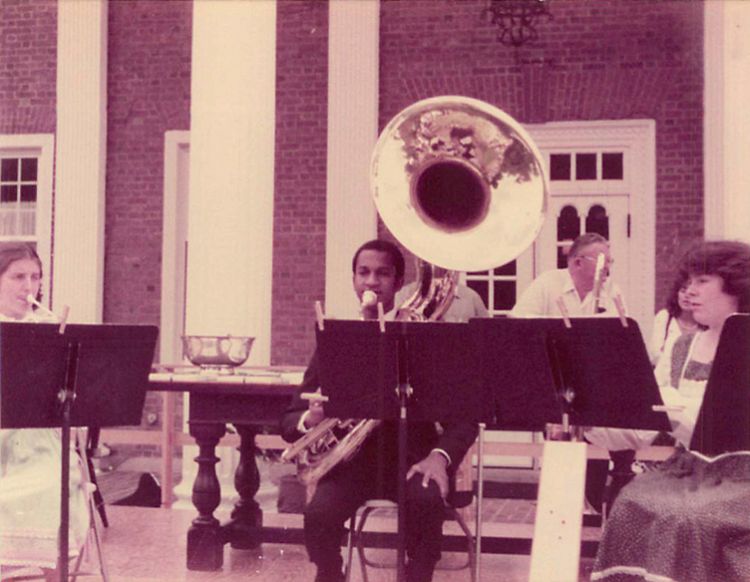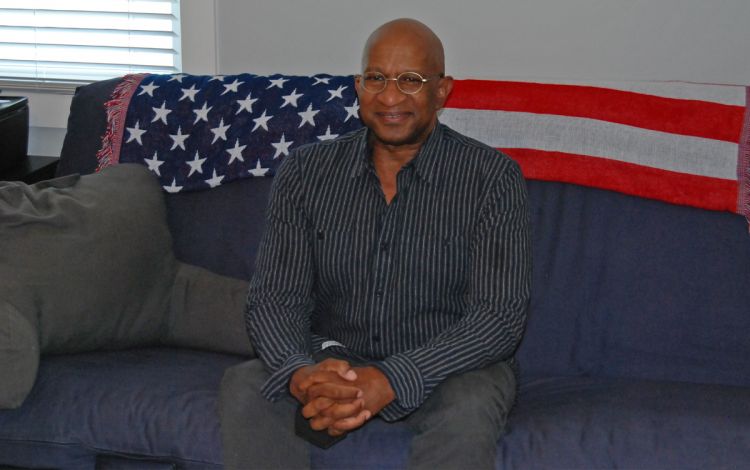New Music by Duke Professor Explores Juneteenth
The North Carolina Symphony will premiere Duke professor and composer Anthony Kelley’s new work, Spirituals of Liberation, on June 18
About a year ago, Dr. Anthony Kelley woke up with a tune in his head. The collection of musical notes took hold, reminding him of old spirituals sung by enslaved people.
In the composition studio of his Durham home, Kelley, Associate Professor of the Practice of Music at Duke, got right to work playing the notes on an electronic keyboard. After a while, he added rhythm and layered sounds and melodies, constructing an early scaffolding for the first movement of the passion project: a new musical work completed in April.
On June 18, in commemoration of Juneteenth, Spirituals of Liberation will be performed for an audience for the first time by the North Carolina Symphony at Koka Booth Amphitheatre in Cary. The 18-minute piece, conducted by Michelle Di Russo, is part of the “Summerfest: Juneteenth Celebration,” which celebrates the contributions of African American musicians and composers such as Duke Ellington, Louis Armstrong and more.
“It’s a little surreal,” said Kelley, who received a bachelor’s and master’s degree from Duke and joined the music faculty in 2000. “You’ve been living with all these weird synth sounds in your head for a long time, and you know what you think it’s going to sound like, but people are going to put their little spin on it.”
The upcoming premiere is one of the fruits of Kelley’s time as the North Carolina Symphony’s Composer-In-Residence from 2021 through 2023. As part of the partnership, Kelley has participated in community programs, workshops and contributed to the group’s educational curriculum that helps teachers across the state instruct the next generation of young musicians.
After the concert on June 18, the symphony will go on a tour with the piece, with a free outdoor performance at the Southern Village Green in Chapel Hill on June 21 as well as concerts later in in New Bern and Tarboro. The piece will also be performed in Fayetteville in September.
The concerts and residency are a meaningful accomplishment for Kelley, a native of Henderson who plays the piano, trombone and tuba. As a teenager on Jan. 23, 1980, he attended his first ever symphonic concert to see the NC Symphony in downtown Raleigh, featuring guest soloist and jazz pianist Billy Taylor. That experience influenced his belief in stylistic blending and helped to inspire his budding interest in music, which eventually led him to Duke.
“This is me coming home,” Kelley said. “This is me writing at home for the first orchestra I was exposed to when I was a junior high school student. This is that orchestra, so it’s a spiritual homecoming.”
He was working on the Juneteenth piece when he started his residency at the North Carolina Symphony. When the Symphony heard about his work in progress, they approached him about commissioning the piece for the special Juneteenth performance on June 18.
The Juneteenth music is Kelley’s personal reflection in three movements of the history of the struggle for freedom and the emancipation of enslaved people on June 19, 1865 in the U.S. As a tribute to those enslaved people, Kelley wanted to tell the full story of Juneteenth, including the joys of freedom and the painful aspects that should never be forgotten.
“I didn’t want to just write a piece literally about the emancipation issue,” he said. “I wanted to write the transition from enslavement to emancipation.”
The first movement, “Work Song,” emulates sounds of building a railroad, a nod to Harriet Tubman and the Underground Railroad. It represents the psychological work of enslaved people to dream of their freedom while engaging in manual labor.
“Elegy for the Blues People,” the second movement, is a lyrical and slow return to the sorrowful qualities of spirituals. It draws its name from Amiri Baraka's theories of the first generation of enslaved people who thought of the U.S. as their home. They were responsible for creating blues music.
The final movement, “Never Forget,” celebrates freedom and efforts to preserve the history of that struggle, with callbacks to melodies from the previous movements.
“Freedom is something to celebrate,” Kelley said, “but it’s also complicated by the past.”
Send story ideas, shout-outs and photographs through our story idea form or write working@duke.edu.